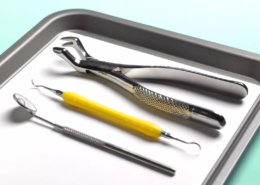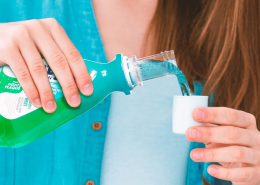 https://www.dentylactive.com/wp-content/uploads/2023/12/gum-disease-scaled.jpg
1707
2560
admin@dentyl
https://www.dentylactive.com/wp-content/uploads/2023/04/dentyl-1.svg
admin@dentyl2023-12-15 10:06:182024-05-23 12:08:17Does Mouthwash Help Gum Disease?
https://www.dentylactive.com/wp-content/uploads/2023/12/gum-disease-scaled.jpg
1707
2560
admin@dentyl
https://www.dentylactive.com/wp-content/uploads/2023/04/dentyl-1.svg
admin@dentyl2023-12-15 10:06:182024-05-23 12:08:17Does Mouthwash Help Gum Disease?Plaque build-up is a common dental issue that can lead to multiple oral health problems if left unchecked. Understanding how plaque forms and how to effectively clean it is crucial for maintaining a healthy smile. If you’re interested in microbiology, the formation of plaque can explain how these tiny bacteria cause cavities, tooth decay and even bad breath.
Common Causes of Plaque Build-Up
Plaque is a sticky film of bacteria that forms on your teeth and gums. It is present in everybody’s mouth, but if it is allowed to build up, it can severely damage your teeth. Plaque build-up is caused by:
- Poor Oral Hygiene: Inadequate brushing and flossing can allow food particles and bacteria to accumulate, leading to plaque formation.
- Dietary Habits: Consuming sugary or starchy foods and drinks provides nourishment for bacteria in your mouth, accelerating plaque formation.
- Saliva Composition: Some individuals naturally tend to develop plaque more quickly due to differences in their saliva’s chemical makeup.
- Smoking and Tobacco Use: Smoking and even vaping regularly dry out the mouth, reducing saliva and creating an environment perfect for the formation of plaque. This increases the risk of gum disease and tooth decay, as well as staining your teeth.
The Science Behind Plaque Formation
Plaque is primarily composed of oral bacteria, their byproducts, and food debris. When we eat, the bacteria in the mouth metabolise the carbohydrates in food left between the teeth. This produces acids, which are a problem in that they weaken your tooth enamel. Secondly, this acid combines with leftover food and saliva to form the sticky, hardened film known as plaque.
Over time, if plaque is not removed through brushing, rinsing and flossing, it can harden into tartar, a stubborn substance that can only be removed by a dentist or dental hygienist.
Treating Plaque Formation
Preventing and treating plaque formation is essential for maintaining good oral health. Here are some effective strategies recommended by dentists and oral hygienists:
- Brushing: Brush your teeth at least twice a day using fluoride toothpaste and a soft-bristle toothbrush to remove plaque.
- Flossing: Daily flossing helps remove plaque from between teeth and along the gumline.
- Regular Dental Check-Ups: Routine dental visits enable your dentist to identify and remove tartar buildup.
- Use Dentyl Mouthwash: Dentyl mouthwash is specifically designed to combat plaque. It contains active ingredients that break down and lift away plaque and bacteria from your teeth and gums.
How Does Dentyl Mouthwash Work?
Mouthwash, when used correctly, can be a valuable addition to your oral care routine. Dentyl mouthwash employs a dual-action formula that not only eliminates bacteria but also visibly lifts debris from your teeth and gums. The unique “two-phase” solution helps ensure a thorough clean, leaving your mouth feeling fresh and revitalised.
- Phase 1: An oil-based solution with essential oils and aromas
- Phase 2: A water-based solution containing the antimicrobial agent, Cetylpyridinium Chloride (CPC), which eliminates up to 99% of bacteria This phase also contains Sodium Fluoride, which can help strengthen the tooth enamel, making it more resistant to tooth decay.
The two phases are shaken together to create an oil-in-water solution that is proven to enhance the effectiveness of CPC, which stops bacteria from clinging to the surface of the teeth. The dissolved oil droplets then attract the bacteria and biofilm, physically carrying plaque and bacteria from the teeth and gums.
Oral health is closely linked to overall health.
While it’s crucial to maintain good oral health to keep your teeth intact and prevent gingivitis, neglecting your teeth and gums can have consequences for the whole body. Poor oral hygiene can lead to issues beyond the mouth.
- Endocarditis: if bacteria spread from your mouth to other parts of the body, they can attach to the inner lining of the heart and cause infection
- Heart disease: some research suggests that infections and inflammation caused by oral bacteria may lead to clogged arteries and strokes.
- Pneumonia: If oral bacteria is pulled into your lungs, this can cause chest infections, pneumonia and other respiratory problems.
- Mental Health: tooth decay and abscesses can cause continuous pain, affecting your relationships and quality of life and leading to irritability, anxiety and depression. The low self-esteem that can come with poor oral health can also become unhealthy.
Looking after your teeth is an important part of self-care for both mental and physical health. Maintaining good oral health can enhance your quality of life and prevent costly dental treatments down the line.
Why Choose Dentyl Mouthwash?
Dentyl mouthwash offers several benefits for your oral health routine:
-
-
- Gentle on Gums: Its alcohol-free formula is gentle on sensitive gums, making it suitable for use after tooth extraction.
- Removes up to 99.9% of bacteria: Dentyl mouthwash contains powerful antimicrobial agent known as Cetylpyridinium Chloride (CPC), which binds with the membrane of the bacteria, enhance their bonding with oil droplets of Dentyl mouthwash when shaken. This allows the Dentyl to remove the bacteria, both quickly and effectively.
- Effective Plaque Removal: Dentyl mouthwash contains unique two phase formula. It consists of an oil phase and a water phase. When shaken, the two liquids combine to form special mixture which physically lifts and removes plaque and bacteria from the mouth, that you can see instantly when you rinse.
- Alcohol-Free: Unlike some mouthwashes, Dentyl is alcohol-free, making it suitable for individuals with sensitive gums. It also won’t dry out your mouth, reducing the chance of accelerated bacteria growth.
-
Understanding the causes of plaque build-up and taking proactive steps to combat it is crucial for maintaining a healthy smile. Incorporating Dentyl mouthwash into your oral health routine can be a smart choice, as it’s designed to effectively tackle plaque and promote overall oral well-being.
References
(1) Healthline, Rebecca Stanborough: What is Dental Plaque?
(2) WebMD: Robert Brennan: Dental Health and Dry Mouth
(3) WebMD: Jabeen Begum: Plaque and Your Teeth
(4) Medicina: Luca Fiorillo: Oral Health: The First Step to Well-Being
(5) BMJ: N Sehgal: Mouth Care and Pneumonia: A Clinician’s Insight
(6) Can J Psychiatry: Steve Kisely, No Mental Health without Oral Health











